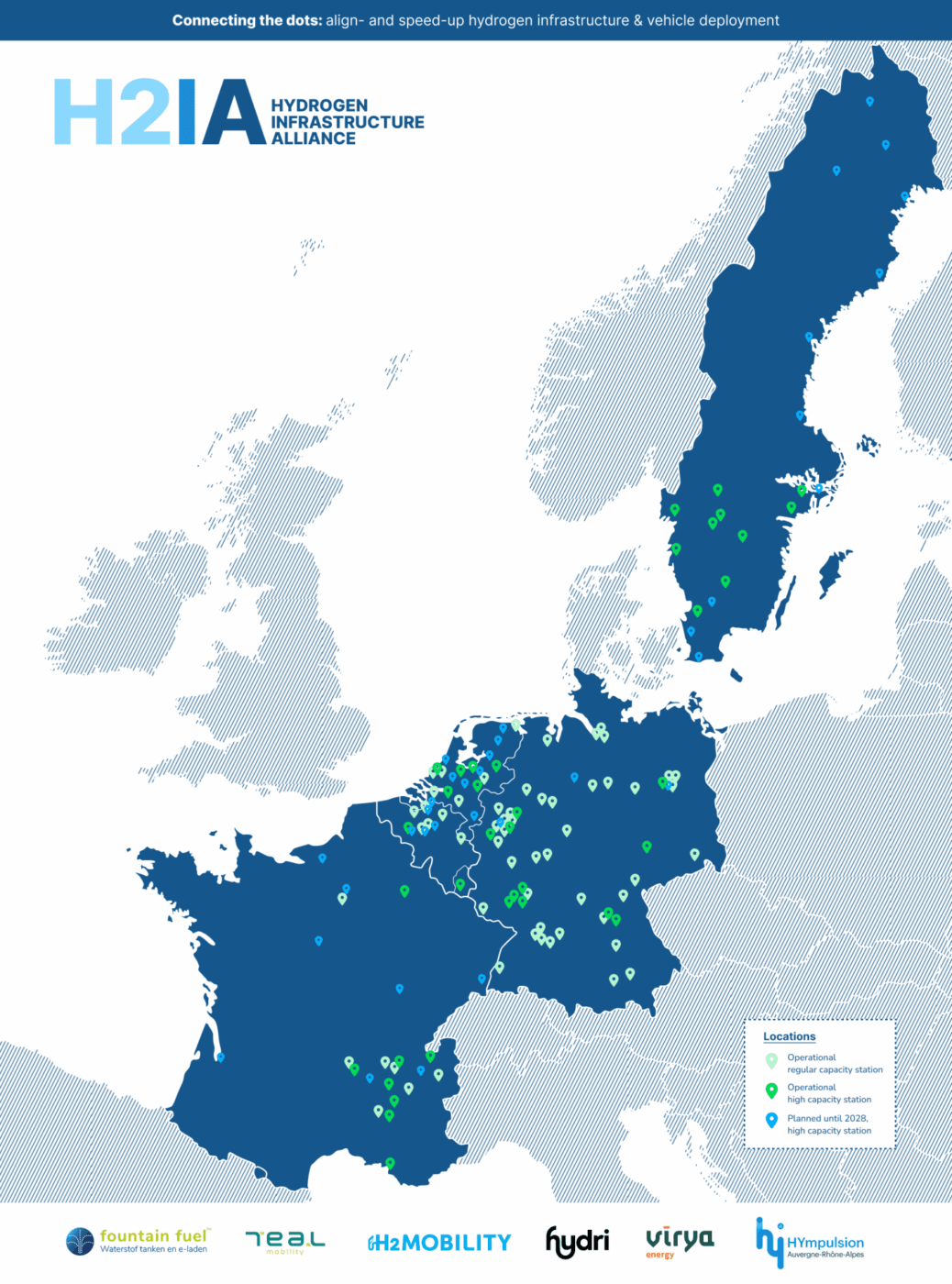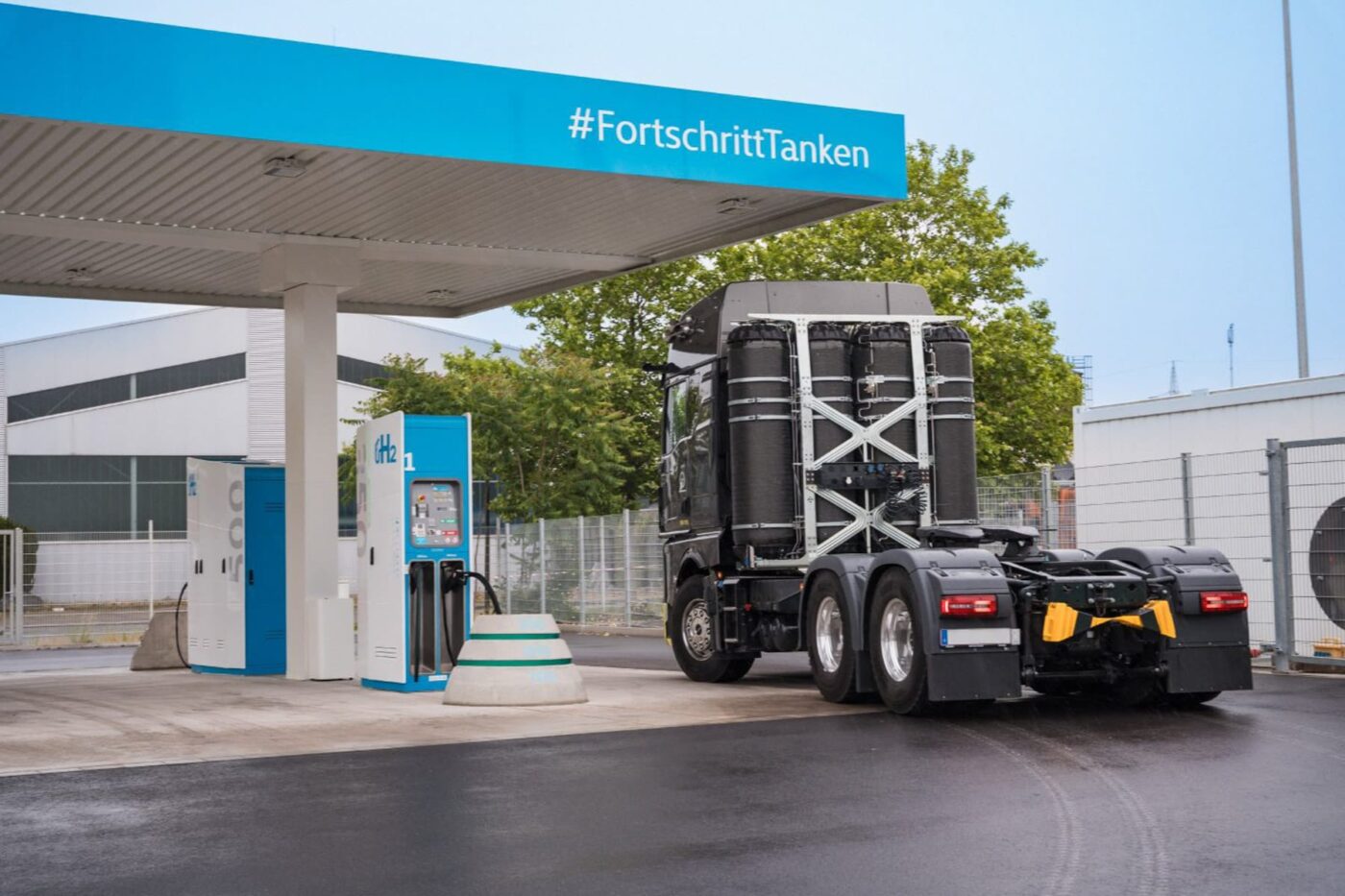Six operators establish ‘H2 Infrastructure Alliance’
But first, let’s take a look at the H2 Infrastructure Alliance: this consortium brings together Hydri (Sweden), TEAL Mobility (France), Fountain Fuel (Netherlands), H2 Mobility (Germany), Virya Energy (Belgium) and HYmpulsion (France). Together, these companies operate 92 hydrogen refuelling stations (HRS) for light and heavy commercial vehicles. As things stand today, a further 39 large refuelling stations are planned by 2028 – enough, according to the operators, to refuel more than 1,800 lorries every day. The network of the six partners currently stretches from northern Sweden to southern France – but there are still significant gaps.
The alliance emphasises the crucial importance of vehicle model availability. It calls on vehicle manufacturers “to accelerate the next phase of hydrogen mobility through vehicle rollout and expanded model offerings.” The aim is to better coordinate and accelerate infrastructure and vehicle expansion by 2028. However, it is questionable how effective this call will actually be: Hyundai has unveiled a new generation of the Nexo this year, and BMW plans to bring the new X5 with fuel cell technology into series production by 2028. In the commercial vehicle sector, however, the Traton Group is sceptical anyway, and Daimler Truck is sticking with customer testing of the Gen H2 Truck for the time being – series production has been postponed until the next decade. So, there are not many models in the pipeline that the members of the ‘H2 Infrastructure Alliance’ can hope for.

“With an ambitious yet realistic pace, it will be possible to realize a connected network of stations that cover Europe,” says the statement, which is referred to as ‘Connectic the Dots’. “By taking the lead and expanding the refuelling infrastructure first, it is possible to break through what is often described as the chicken-or-egg dilemma.” The alliance sees parallels with the development of mobile communications infrastructure in the early 2000s. “Transmission towers and good signal coverage led to a strong increase in mobile telephone use. In return, this led to the placement of more, and improved, transmission towers and ultimately to advancements such as the G5 networks. With high numbers of transmission towers, mobile phones and high utilizations rates the total costs of using the system decreased,” the statement says.
At least in Germany, the gaps that the alliance wants to close are initially becoming larger. This is because the series of site closures at H2 Mobility, in which older filling stations are mostly being taken out of service without more modern replacements, is continuing. A few days ago, the operator announced that it would be closing the Berlin-Rothenbachstraße, Biebelried, Braunschweig, Duisburg, Essen, Hasbergen, Ingolstadt, Kirchheim, Laatzen, Limburg, Lohfelden, Metzingen, Rheda-Wiedenbrück and Wendlingen locations on 31 December 2025. “Customers will be able to refuel at these locations until the end of December, after which the stations will be closed and dismantled,” the announcement states.
“The stations that marked the beginning of hydrogen mobility more than ten years ago can no longer be adapted to today’s changing technical standards and growing requirements. They have limited storage capacity and, from today’s perspective, insufficient performance for commercial vehicle operations. These stations were originally built for a passenger car market that has not developed as expected in recent years,” said Martin Jüngel, Managing Director and CFO of H2 Mobility. “In parallel, we are investing in more powerful and future-oriented stations, a new generation of hydrogen refuelling stations. They feature significantly higher performance and resilience, enabling refuelling of buses and trucks with 350-bar tank systems in less than 15 minutes.”
According to Jüngel, hydrogen sales by buses and trucks in Germany already account for well over 70 per cent. “The aim is to further advance the regulatory framework at the European level. The H2 Infrastructure Alliance is sending an important signal in this regard,” says Jüngel. “The realisation of a Europe-wide filling station network is already in full swing and now requires commitment on the part of OEMs for increasing vehicle numbers.”
H2 Mobility wants to prove, in partnership with fuel cell truck rental company Hylane, that hydrogen prices, often criticised as too high, can fall significantly with increasing demand. From 1 January 2026, Hylane customers will be able to fill up with hydrogen for around 8 euros net per kilogram at selected H2 Mobility filling stations. “The new generation of stations represents an increase in the number of dispensers, larger hydrogen delivery volumes supplied via a trailer system, and substantially more powerful technology, partly developed in-house by H2 MOBILITY. These stations support high vehicle throughput and meet the specific requirements of commercial fleets,” wrote H2 Mobility. The offer is only valid for refuelling with the Hylane fuel card and is available in the Düsseldorf and Rhine-Neckar regions, where H2 Mobility’s most modern filling stations are located.
“The new price level is the result of a strategic partnership: Hylane bundles the hydrogen requirements of its fleet customers – including leading logistics and retail companies – and guarantees H2 Mobility continuously high purchase volumes,” the announcement states. This planning security enables better utilisation of the filling stations and allows H2 Mobility to purchase hydrogen strategically and cost-efficiently. This results in stable, reduced prices that promote the economic operation of hydrogen trucks in everyday use.
This article was first published by Sebastian Schaal for electrive’s German edition.




0 Comments